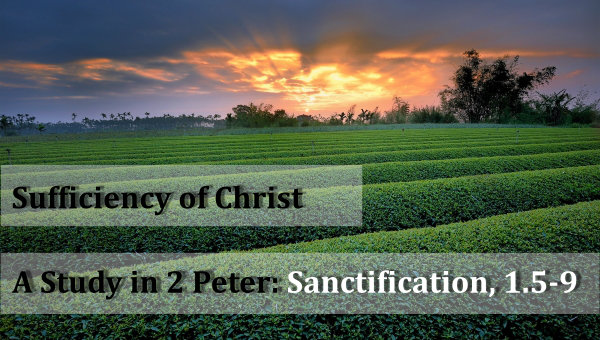By Tyson Thorne

Yesterday we learned that Peter is helping to define the Christian life through a series of three elements; the first of these elements is regeneration. We defined regeneration as restoring one’s inclination toward righteousness and a right relationship with the Creator. The second of these three elements is sanctification. This term is used widely in both testaments to signify something or some people as set apart as sacred. In Peter’s use, the term is used more specifically as “the process of gradual purification from sin and progressive spiritual growth that should mark the life of the believer.”[1]
For this very reason, make every effort to add to your faith excellence, to excellence, knowledge; to knowledge, self-control; to self-control, perseverance; to perseverance, godliness; to godliness, brotherly affection; to brotherly affection, unselfish love. For if these things are really yours and are continually increasing, they will keep you from becoming ineffective and unproductive in your pursuit of knowing our Lord Jesus Christ more intimately. But concerning the one who lacks such things – he is blind. That is to say, he is nearsighted, since he has forgotten about the cleansing of his past sins.[2]
In this section, Peter describes for us a process of sanctification (adding to our faith), beginning with goodness and ending with, surprise, love. As we’ve discussed on many occasions, “love” is the permanent and overriding principle of Christianity. As a process, it is important to understand each step. For this reason we have performed a word study on each of these steps:
- excellence – (areth) when used intrinsically or attributively can mean manliness, valor, goodness, but in most cases it takes on the meaning of virtuous; moral rectitude, put on every virtue of righteousness.)
- knowledge – (gnosis) familiarity, awareness or understanding gained through experience or study.
- self-control – (egkrateia) control of one’s emotions, desires, or actions by one’s own will.
- perseverance – (uromone) patient continual endurance in waiting; the holding to a course of action, belief, or purpose without giving way.
- godliness – (eusebeia) pious; having great reverence for God.
- brotherly affection – (philadelphia) the benevolence that man should rightfully feel toward others in the body of Christ.
- love – (agape) man’s devotion to or adoration of God.
Each of these characteristics grows in the life of the Jesus-follower and as it does so, it leads to growth in the next area. The pursuit of these character traits results in an effective and productive life and gives hands and feet to our faith. Those who do not pursue these things is in danger of falling away from God. I’m not going to go beyond what Peter has written and claim anyone will lose their salvation In fact, he shows how Jesus is sufficient for the exact opposite next), but a life without God, especially for those who have once experienced God’s forgiveness, isn’t much of a life. IT leads to regrets and heartbreak, a sense of purposelessness and an ineffectual life.
[1] Mangum, D. (2016). Sanctification. In J. D. Barry, D. Bomar, D. R. Brown, R. Klippenstein, D. Mangum, C. Sinclair Wolcott, … W. Widder (Eds.), The Lexham Bible Dictionary. Bellingham, WA: Lexham Press.
[2] NET Bible, www.bible.org
|
|
